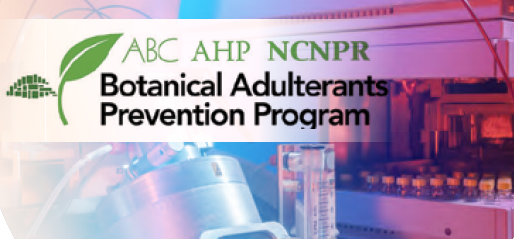
With the release of its long-awaited Standard Operating Procedure for Disposal/Destruction of Irreparably Defective Articles in November, the Botanical Adulterants Prevention Program (BAPP) has taken a major step forward in its ongoing effort to rid the nutrition and herbal medicine industries of adulterated or otherwise fraudulent ingredients.
The “BAPP SOP” guidelines, as the new document is called, lay out specific contract terms between ingredient buyers and ingredient suppliers that empower buyers to destroy—at the supplier’s expense—any botanical raw materials deemed “irreparably defective” by an independent, accredited 3rd party analytical lab using validated techniques.
The definition of “irreparably defective” includes ingredients that contain environmental toxins, pesticide or herbicide residues, chemical or microbial contaminants, unlawful pharmaceutical ingredients, drug residues, illegal dyes, undisclosed fillers, or plant materials proven to be from species other than the desired and labeled species.
Between 35-45% of the herbs found in the top-selling botanical categories are potentially subject to contamination or intentional adulteration
BAPP is a joint effort by the American Botanical Council, the American Herbal Pharmacopoeia, and the University of Mississippi’s National Center for Natural Products Research aimed at reducing the burden of contaminated and adulterated herbs in the global supply chain.
A 12-Year Effort
Since its founding 12 years ago, the BAPP collaborative has issued 75 peer-reviewed documents detailing the problem of intentional, unintentional, or economically-motivated adulteration of raw materials, extracts, and essential oils.
Many common medicinal herbs are subject to adulteration, including Ginkgo, St. John’s Wort, Elderberry, Lavender, Pomegranate, Grape Seed, Bilberry, Saw Palmetto, Mint, Skullcap, and Cordyceps. The problem is especially prevalent for herbs that are rare, slow-growing, wild-crafted, or otherwise costly.
The substitution of a cheap potentially less effective filler herb for a more expensive one, often increases when there is a sudden surge in demand. This became a worldwide problem with Elderberry after Covid awakened massive public interest in “immune system health.” Sales of elderberry products soared, and the demand put extreme strains on the supply of actual Elderberry.
The definition of “irreparably defective” includes ingredients that contain environmental toxins, pesticide or herbicide residues, chemical or microbial contaminants, unlawful pharmaceutical ingredients, drug residues, illegal dyes, undisclosed fillers, or plant materials proven to be from species other than the desired and labeled species.
Another form of economically-motivated adulteration is the use of pharmaceutical ingredients to spike an herb for greater effect, or the inclusion of synthetic ingredients in raw materials sold as entirely natural.

Between 35-45% of the herbs found in the top-selling botanical categories are potentially subject to contamination or intentional adulteration, estimated Mark Blumenthal, founder and executive director of the American Botanical Council (ABC). This does not mean these herbs are always adulterated, or that the adulterations are necessarily dangerous. But it means that the risk is there.
Addressing an Ancient Problem
The problem is as old as commerce itself. Dioscorides, Pliny the Elder, Galen and other medical authors of antiquity described alteration of medically valuable herbs over 2000 years ago.
“History teaches that high-value ingredients are at most risk of economic adulteration during periods of supply chain shortages and/or sudden demand increases,” said Michael D. Levin, a supplement industry consultant, and one of the architects of the BAPP SOP guidelines.
BAPP SOP lays out a pathway for ethical supplement companies to implement a strict “Burn it, don’t return it” policy for adulterated ingredients. If a supplier sells a batch of adulterated or contaminated herbs or extracts from adulterated herbs, and the problem cannot be remedied, the contract terms would justify the destruction of the entire batch at the seller’s expense.
The Food and Drug Administration’s Good Manufacturing Practices (GMPs) give clear definitions of what constitutes adulteration in dietary supplement products, and they require supplement manufacturers to test for and prevent the sale of adulterated products. But the existing GMPs do not delineate procedures for eliminating corrupted ingredients from the supply chain, Levin explained.
He and others on the BAPP team believe their SOP guidelines will address this regulatory gap which, until now, had left executives at ethical supplement brands with difficult choices: they could choose to destroy adulterated materials at their own expense and then replace them, or return the tainted product to the supplier for a refund or credit, knowing that the adulterated herbs would very likely end up in some other company’s products.
Closing the Regulatory Gap
Without a clear pathway for eliminating them, bad raw materials rejected by honest companies will usually end up somewhere on the market. Suppliers typically re-sell them to unethical players who buy them at a discount and either lack sufficient analytical testing to detect adulterants, or that choose to turn a blind eye toward substandard materials.

BAPP-SOP addresses this problem by creating standardized terms of agreement that would ensure that tainted materials are destroyed and eliminated from the supply chain, not resold to bottom-feeder companies.
The contract terms and dispute resolution procedures outlined in the BAP-SOP document have been in development for the last four years, says Levin. The program was developed with input and feedback from many of the major botanical medicine and dietary supplement companies, and Levin says it has strong industry buy-in.
Over the course of the last few years, the proposed contract language was thoroughly vetted by seven prominent supplement industry attorneys, and subjected to scrutiny and feedback from industry stake-holders.
Adaptable Solutions
The finalized SOP document was formally introduced at an industry-wide gathering in November at SupplySide West, the nation’s largest nutritional and herbal raw materials trade show. It represents the first set of best practice guidelines specifically focused on how to deal with defective raw materials.
BAPP SOP lays out a pathway for ethical supplement companies to implement a strict “Burn it, don’t return it” policy for adulterated ingredients. If a supplier sells a batch of adulterated or contaminated herbs, and the problem cannot be remedied, the contract terms would justify destruction of the entire batch at the seller’s expense
Though it was developed by botanical medicine experts specifically for the herbal industry, these SOP guidelines are also potentially applicable to nonbotanical ingredients used in supplements, foods, beverages, cosmetics, or really any sort of consumer product. “It’s a very modular document, adaptable to fit various specific business situations,” says Levin.
Levin acknowledged that it could take several years before the agreement terms outlined in BAPP-SOP actually become the norm across the herbal industry. But he says the program has had strong support from most of the industry’s key players some of whom are already implementing terms like this in their purchasing contracts.
“This is a voluntary industry initiative to address a consumer safety issue,” he told Holistic Primary Care. “It is about ensuring that the promise of safe and natural products is preserved. It is one tool, but an important tool, to solve the problem of adulterated raw materials and to support product quality in the industry.”
The BAPP-SOP guidelines give manufacturers the tools they need to apply direct economic pressure on raw materials suppliers and to hold them accountable for improving the quality of the ingredients they sell. That’s bound to be a major benefit for anyone who uses herbal medicines.
END







